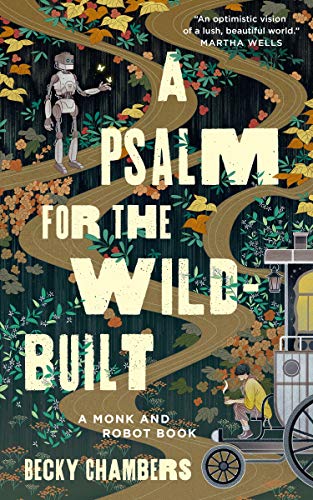A Psalm for the Wild-Built by Becky Chambers

January 2022
Strong world building
- Reliable phone-computers designed to last a lifetime
- Slow reveal of what the world is like, and what "Post-Transition" means
- Vivid descriptions of ruins of modernity ("Factory Age")
Factory Age ruins looked the same. Hulking towers of boxes, bolts, and tubes. Brutal. Utilitarian. Visually at odds with the thriving flora now laying claim to the rusted corpse.
- "Tea Monks", basically traveling tea merchant-shrinks. Great concept!
- Original pantheon of gods, quite mysterious. Well written slow reveal towards the end segment about the Hermitage.
- Loved the robots that have a finite lifespan, but create new robots out of spare parts ("wild-built")
I guess you’d say family tree is comprised of many wild-built individuals, descended in total from”—the robot counted on its fingertips—“sixteen factory originals.”
- Loved the robot names, and how they are perhaps more closely integrated into nature than humans.
- Excellent low tech robot message boards.
Writing and style
- Some cringe-worthy writing that reads a bit like fan fiction.
- Some overly florid sentences, for example:
Sun cascaded through the hole cut in the canopy, creating a bountiful column of light that played pleasingly with the butter-colored paving inlaid with vibrant stones.
- Prolific use of "they" pronouns which I found awkward. Maybe a matter of habit? It was the first book in which this really stood out to me:
Ms. Jules was the first to arrive, as always. Dex smiled to themself as she approached
- Character development a bit weak. Dex seems like an angsty teenager without much depth. Is this young adult writing? I think no, given the prolific cursing towards the end.
Strong ecosystem musings
- I'm a bit obsessed by this idea that Subsystems that integrate conflict can lead to resilient systems, and this fragment resonated with me:
It must have been such a relief to be free of predators and eat whatever the hell you wanted. But that was the exact opposite of what the ecosystem needed. The ecosystem required the elk to be afraid in order to stay in balance. But elk don’t want to be afraid. Fear is miserable, as is pain. As is hunger. Every animal is hardwired to do absolutely anything to stop those feelings as fast as possible. We’re all just trying to be comfortable, and well fed, and unafraid. It wasn’t the elk’s fault. The elk just wanted to relax.” Dex nodded at the ruined factory. “And the people who made places like this weren’t at fault either—at least, not at first. They just wanted to be comfortable. They wanted their children to live past the age of five. They wanted everything to stop being so fucking hard. Any animal would do the same—and they do, if given the chance.” “Just like the elk.”